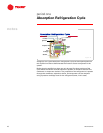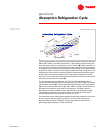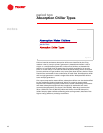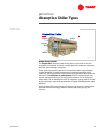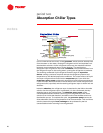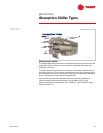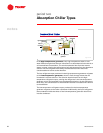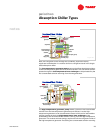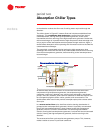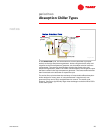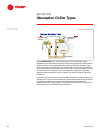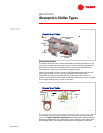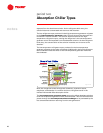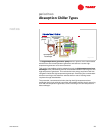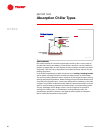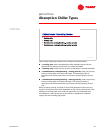
24 TRG-TRC011-EN
notes
period two
Absorption Chiller Types
to the absorber reduces the flow rate of cooling water required through the
absorber.
The chiller shown in Figure 27 is steam-fired and includes an additional heat
exchanger. This condensate heat exchanger transfers heat from the hot
condensed steam, leaving the high-temperature generator, to the cooler
intermediate solution returning to the high-temperature generator. Notice that
this heat exchanger is in parallel with the high-temperature heat exchanger and
only a portion of the intermediate solution passes through each one. Again, a
double-effect absorption chiller operating with hot water would not include the
condensate heat exchanger.
The precooled, concentrated solution leaving the high-temperature heat
exchanger then mixes with the rest of the intermediate solution that is returning
from the low-temperature generator, before traveling to the low-temperature
heat exchanger.
All double-effect absorption chillers are constructed from the same basic
components: high-temperature generator, low-temperature generator,
condenser, evaporator, absorber, two solution heat exchangers, and several
pumps. There are, however, three common methods in which the solution can
be circulated through the chiller: series, parallel, and reverse-series. The
double-effect chiller used in the previous example employs the reverse-series
flow cycle.
In a reverse-series flow cycle, the dilute solution leaving the absorber is
pumped to the low-temperature generator, where it is partially concentrated.
Part of this intermediate solution is then pumped to the high-temperature
generator, where it is further concentrated. The remaining intermediate
solution, leaving the low-temperature generator, is mixed with the concentrated
solution, leaving the high-temperature generator, before returning to the
absorber.
The reverse-series flow cycle requires two generator pumps. This, however,
makes it easier to control in part-load conditions.
high
high
-
-
temperature
temperature
generator
generator
absorber
absorber
low
low
-
-
temperature generator pump
temperature generator pump
high
high
-
-
temperature
temperature
generator pump
generator pump
low
low
-
-
temperature
temperature
generator
generator
Figure 28



